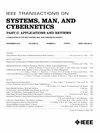Performance comparison of fused soft control/hard observer type controller with hard control/hard observer type controller for switched reluctance motors
IEEE Transactions on Systems Man and Cybernetics Part C-Applications and Re
Pub Date : 2002-05-01
DOI:10.1109/TSMCC.2002.801724
引用次数: 6
Abstract
Both soft computing (SC) and hard computing (HC) techniques are often successful for solving real-world control problems. In cases where problems could be solved by either or both methodologies, an important research problem is to find what are the advantages for fusing SC methods together with HC methods, rather than using the HC method alone. Hence, in this paper, a performance comparison is detailed for a fused soft control/hard observer type controller (where a classical or HC type observer is fused with an adaptive fuzzy or SC type controller) and a hard control/hard observer type controller (where both the observer and feedback linearization controller are classical HC types). The domain in which this comparison is made is for the sensorless speed control of switched reluctance motors (SRMs). This is because this type of motor has highly nonlinear characteristics, and the HC type controller can often be detrimentally affected by modeling inaccuracies, as well as noise. Simulation and experimental results are illustrated to show the performance comparison of the soft control/hard observer type controller and the hard control/hard observer type controller under a wide range of identical operation conditions including transient speed and torque, SRM model parameter variations, and measurement noise. It can be seen from the results that the soft control/hard observer type exhibits a better performance than the hard control/hard observer type controller.开关磁阻电机熔接软控制/硬观测器型控制器与硬控制/硬观测器型控制器的性能比较
软计算(SC)和硬计算(HC)技术通常都能成功地解决现实世界的控制问题。在可以用一种或两种方法解决问题的情况下,一个重要的研究问题是找出将SC方法与HC方法融合在一起的优势,而不是单独使用HC方法。因此,在本文中,详细比较了融合软控制/硬观测器类型控制器(其中经典或HC类型观测器与自适应模糊或SC类型控制器融合)和硬控制/硬观测器类型控制器(其中观测器和反馈线性化控制器都是经典HC类型)的性能。该比较的领域是开关磁阻电动机(srm)的无传感器速度控制。这是因为这种类型的电机具有高度非线性特性,并且HC类型控制器通常会受到建模不准确性以及噪声的不利影响。仿真和实验结果显示了软控制/硬观测器型控制器和硬控制/硬观测器型控制器在广泛的相同运行条件下的性能比较,包括瞬态速度和转矩、SRM模型参数变化和测量噪声。从结果可以看出,软控制/硬观测器类型的控制器比硬控制/硬观测器类型的控制器表现出更好的性能。
本文章由计算机程序翻译,如有差异,请以英文原文为准。
求助全文
约1分钟内获得全文
求助全文
来源期刊
自引率
0.00%
发文量
1
审稿时长
3 months

 求助内容:
求助内容: 应助结果提醒方式:
应助结果提醒方式:


